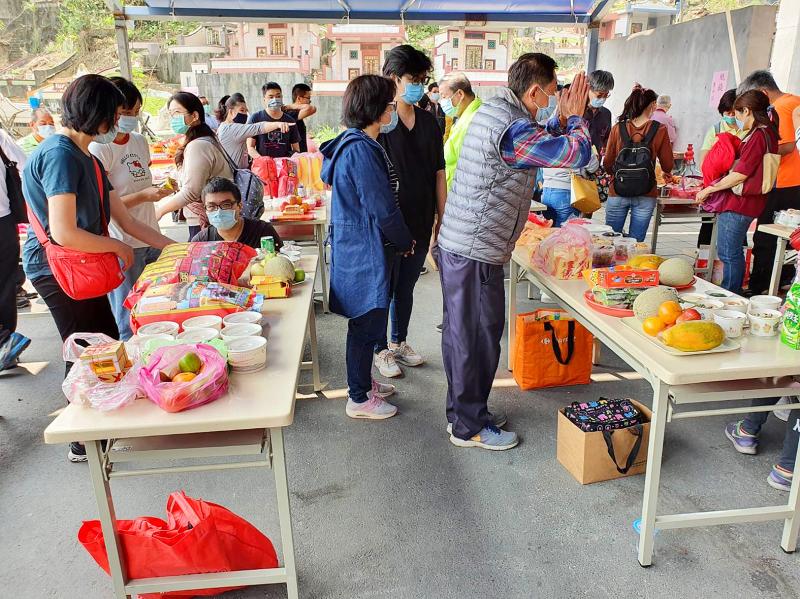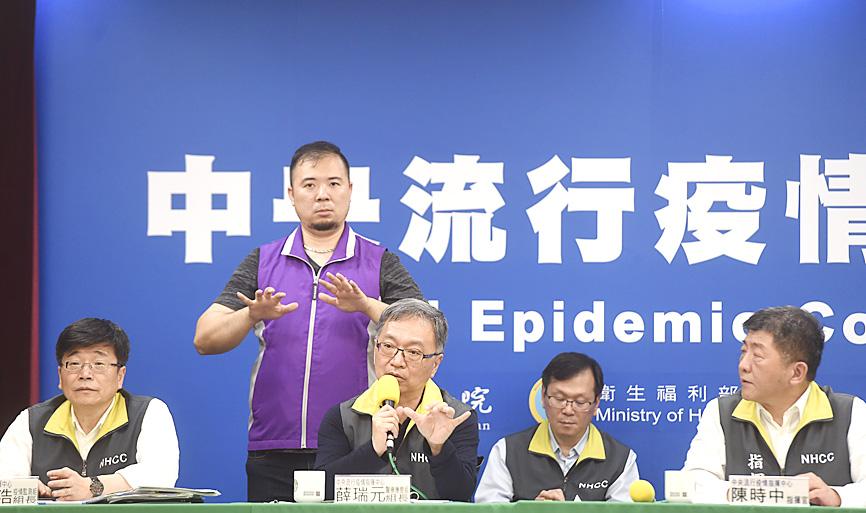Flight transits through all Taiwanese airports would be banned for two weeks, starting tomorrow, the Central Epidemic Command Center (CECC) said yesterday as it announced 16 new confirmed cases of COVID-19, bringing the nation’s total to 169.
Minister of Health and Welfare Chen Shih-chung (陳時中), head of the center, said all flight transits would be banned through April 7.
In light of the rapidly increasing number of imported COVID-19 cases, there was a need to further reduce cross-border travel and the risk of disease transmission, the center said.

Photo: Chiu Shu-li, Taipei Times
The Civil Aeronautics Administration has informed airlines about the new measures, and anyone who has not boarded their flight by 12am tomorrow in Taipei would not be permitted to make a connection in Taiwan, said Deputy Minister of the Interior Chen Tsung-yen (陳宗彥), deputy head of the center.
The number of travelers entering Taiwan dropped from about 9,000 people on Thursday to about 5,000 people on Saturday, the majority of whom are Taiwanese and a very few Alien Resident Certificate (ARC) or special permit holders.
Information on all returning travelers who are being placed under mandatory home quarantine is being synced with the National Police Agency’s “M-Police” mobile phone integrated query system, so that when police conduct spot checks, they can easily identify people who are under quarantine, Chen Tsung-yen said.

Photo: Chien Jung-fong, Taipei Times
The health minister said the 16 latest cases were 13 imported ones and three domestic, including a nurse at a long-term care center, the health minister said.
Deputy Minister of Health and Welfare Hsueh Jui-yuan (薛瑞元) said the nurse, who is in her 20s and had not been abroad recently, developed a fever, weakness and dizziness on March 12, sought treatment on Monday and Friday last week, and tested positive on Saturday.
All 81 people at the care center — 53 residents and 28 staff — were tested by the CECC on Saturday night, and the results so far have all been negative, he said.
The care center’s residents were all relocated to single rooms at a hospital and two quarantine centers yesterday afternoon, while the staff were ordered to isolate at home for 14 days, Hsueh said.
Chen Shih-chung said the center took immediate action after the nurse tested positive out of concern that as a long-term care facility, her workplace could lead to a cluster of cases, and employees of the Ministry of Health and Welfare’s Taoyuan General Hospital and Linkou Chang Gung Memorial Hospital worked overnight to complete the testing.
The other two domestic cases are a German researcher and an Austrian researcher who attended a meeting with the nation’s 124th case, another researcher at the same institute — and a professor who visited the US from March 1 to March 10 and tested positive yesterday, he said.
Centers for Disease Control (CDC) Director-General Chou Jih-haw (周志浩) said that as the professor was the first to experience COVID-19 symptoms — on March 14 — authorities consider him to be the source of infection for four cases at the institute.
Of Taiwan’s confirmed cases, 36 are domestic and 133 imported, but the infection source of six of the domestic cases is not yet known, including the nurse’s, while the first three did not lead to further infections, Chen Shih-chung said.
The remaining three — the 100th, 134th and 156th — might have higher risks of transmission in local communities, so the CECC is conducting contact investigations to clarify them, he said.
“We still define the current situation as sporadic local transmission,” he said when reporters asked if Taiwan has entered the “community spread” stage.

The Taiwanese passport ranked 33rd in a global listing of passports by convenience this month, rising three places from last month’s ranking, but matching its position in January last year. The Henley Passport Index, an international ranking of passports by the number of designations its holder can travel to without a visa, showed that the Taiwan passport enables holders to travel to 139 countries and territories without a visa. Singapore’s passport was ranked the most powerful with visa-free access to 192 destinations out of 227, according to the index published on Tuesday by UK-based migration investment consultancy firm Henley and Partners. Japan’s and

NATIONAL SECURITY THREAT: An official said that Guan Guan’s comments had gone beyond the threshold of free speech, as she advocated for the destruction of the ROC China-born media influencer Guan Guan’s (關關) residency permit has been revoked for repeatedly posting pro-China content that threatens national security, the National Immigration Agency said yesterday. Guan Guan has said many controversial things in her videos posted to Douyin (抖音), including “the red flag will soon be painted all over Taiwan” and “Taiwan is an inseparable part of China,” while expressing hope for expedited “reunification.” The agency received multiple reports alleging that Guan Guan had advocated for armed reunification last year. After investigating, the agency last month issued a notice requiring her to appear and account for her actions. Guan Guan appeared as required,

Japan and the Philippines yesterday signed a defense pact that would allow the tax-free provision of ammunition, fuel, food and other necessities when their forces stage joint training to boost deterrence against China’s growing aggression in the region and to bolster their preparation for natural disasters. Japan has faced increasing political, trade and security tensions with China, which was angered by Japanese Prime Minister Sanae Takaichi’s remark that a Chinese attack on Taiwan would be a survival-threatening situation for Japan, triggering a military response. Japan and the Philippines have also had separate territorial conflicts with Beijing in the East and South China

A strong cold air mass is expected to arrive tonight, bringing a change in weather and a drop in temperature, the Central Weather Administration (CWA) said. The coldest time would be early on Thursday morning, with temperatures in some areas dipping as low as 8°C, it said. Daytime highs yesterday were 22°C to 24°C in northern and eastern Taiwan, and about 25°C to 28°C in the central and southern regions, it said. However, nighttime lows would dip to about 15°C to 16°C in central and northern Taiwan as well as the northeast, and 17°C to 19°C elsewhere, it said. Tropical Storm Nokaen, currently